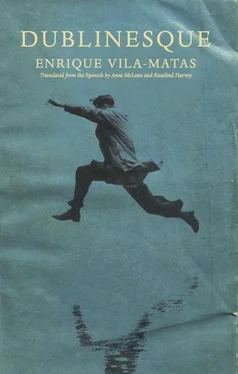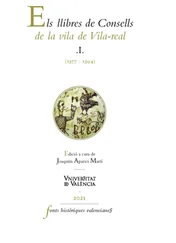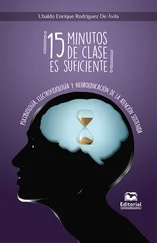If he didn’t sit in front of the all-consuming computer screen, what else could he do? Well, he could carry on researching Dublin, or go back to scaring the neighbors by walking in the rain in short trousers, or else play dominoes with the retired men in the bar downstairs, or get drunk again like in the old days, supremely, savagely drunk; he could go to Brazil or Martinique, convert to Judaism, reap a wheat field, go and screw a casual girlfriend, jump into a swimming pool of freezing water. Although maybe the most sensible thing to do would be to put all his energy into preparing for a future trip to New York, the first stage of which will be in Dublin.
One day, while traveling through Mexico with José Emilio Pacheco, a book of whose he had just published — he would go on to publish another two — they arrived at the port of Veracruz in a friend’s convertible and went straight down to look at the sea. Those shapes I see by the sea, said Pacheco, shapes that immediately give rise to metaphorical associations, are they instruments of inspiration or of false literary quotes?
Riba asked him to repeat the sentence and the question. And when Pacheco did so, he saw he had understood them perfectly. Something similar always happened to him. He made associations between ideas, and always had a remarkable tendency to read his own life like a book. Publishing, and consequently having to read so many manuscripts, contributed still more to this tendency of his to imagine that metaphorical associations and an often highly enigmatic code lay concealed behind any scene in his daily life.
He considers himself as much a reader as he is a publisher. It was basically his health that forced him to retire from publishing, but it seems to him it was also partly the golden calf of the gothic novel, which created the stupid myth of the passive reader. He dreams of the day when the spell of the best-seller will be broken, making way for the reappearance of the talented reader, and for the terms of the moral contract between author and audience to be reconsidered. He dreams of the day when literary publishers can breathe again, those who live for an active reader, for a reader open enough to buy a book and allow a conscience radically different from his own to appear in his mind. He believes that if talent is demanded of a literary publisher or a writer, it must also be demanded of a reader. Because we mustn’t deceive ourselves: on the journey of reading we often travel through difficult terrains that demand a capacity for intelligent emotion, a desire to understand the other, and to approach a language distinct from the one of our daily tyrannies. As Vilém Vok says, it’s not so simple to feel the world as Kafka felt it, a world in which movement is denied and it becomes impossible even to go from one village to the next. The same skills needed for writing are needed for reading. Writers fail readers, but it also happens the other way around and readers fail writers when all they ask of them is confirmation that the world is how they see it. .
The phone rings.
What was he saying to himself? He was thinking about the arrival of a new time that might bring with it this revision of the demanding pact between writers and readers and that the return of the talented reader might be possible. But it could be that this dream is already unrealizable. Better to be realistic and think about the Irish funeral.
He will go to Dublin. Partly to do something. To feel a little busier in his retirement.
On odd-numbered days, and always at this time, Javier calls on the phone, a faithful friend and thoroughly methodical man. Riba still hasn’t picked up and he already knows perfectly well it can only be Javier. He turns down the volume on the radio, where Brassens’s “Les Copains d’Abord” is playing, coincidental background music he thinks most appropriate to his friend’s phone call. He picks up.
“I’m going to Dublin in June, did you know?”
Due to the fact that in the last two years he has stopped drinking and avoids going out at night, he has recently seen little of Javier, a very nocturnal man. Nevertheless, their relationship is still active, although now it’s nurtured only by telephone conversations every other day at noon and the occasional lunch date. Maybe over time the absence of nights out together will gradually erode the friendship, but he doesn’t think so, because he is one of those who thinks that friendships are strengthened by people seeing one another very infrequently. He’s not sure that friends exist, exactly. Javier himself usually says that there are no friends, only moments of friendship.
Javier calls on odd days. And he always does so around midday, thinking, perhaps, that for moments of friendship this time of day might offer more guarantees than others. He’s very methodical. But after all, so is Riba. Does he not, for example, systematically visit his parents every Wednesday afternoon? Does he not sit punctually in front of his computer every day?
Now Javier is asking him how the talks about selling his business are going, and Riba is explaining that he feels disheartened and that in the end he might not sell his assets, might leave things as they are, in the hope of better times. There are precedents, he says, for other glorious ruins in the Barcelona publishing industry. The case of Carlos Barral, for example. Javier interrupts him to dispute the idea that Barral was ruined. Riba has no desire to waste his energy arguing, Riba doesn’t even bother to pursue the topic. Then they talk about Spider and he tells Javier he’s come to identify entirely with the main character of this strange film. And Javier, who suddenly remembers he’s seen it too, says he doesn’t understand what Riba saw in the film, as he remembers it as being terribly depressing, and very dull. By now Riba is used to Javier taking the opposite view to him on everything. Their friendship or, rather, their moments of friendship are based on them differing almost completely on questions of art. Riba published Javier’s first five novels, before Javier ran off to more commercial publishers. And although he has always disagreed with some aspects of his literary aesthetic, Riba has always had absolute respect for the power of his friend’s realist style.
When the topic of Spider wanes, they talk about the incessant, even disturbing rain of the past few days. Then, Riba tells him — he told him before — how he spent an entire day in Lyon without speaking to anyone and set out a general theory of the novel. And Javier ends up getting very nervous. Writers don’t put up at all well with publishers taking literary baby steps, and Javier ends up interrupting Riba to say indignantly that he already told him, the other day, that he was glad he’d managed to write something in Lyon, but there’s nothing more French than a general theory for novels.
“I didn’t know theories were just a French thing,” says Riba, surprised.
“They are, I’m telling you. What’s more, it’d do you good to stop being a café thinker. A French café thinker, I mean. You should forget about Paris. That’s my impartial piece of advice for today.”
Javier is from Asturias, from a town near Oviedo, although he’s lived in Barcelona for over thirty years. He’s fifteen years younger than Riba and has a remarkable tendency to give advice and above all to be unequivocal. He’s very inclined to use a categorical tone. But today Riba can’t understand what he’s getting at and asks what he’s got against the cafés of Paris.
Riba starts to remembering that his vocation as a publisher began during a trip to Paris after May ’68. As he was stealing left-wing essays with unusual happiness from the François Maspero bookshop — where the booksellers looked kindly upon people looting the place — he decided to devote himself to a profession as noble as that of publishing avant-garde novels and rebellious books that later enthusiasts would steal from the Maspero and other left-wing bookshops. Some years afterward, he changed his mind and gave the revolutionary dream up for dead and decided to be reasonable and charge for the books he published.
Читать дальше












